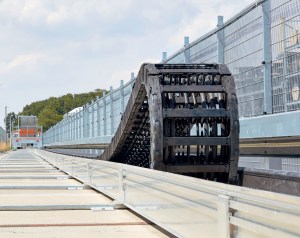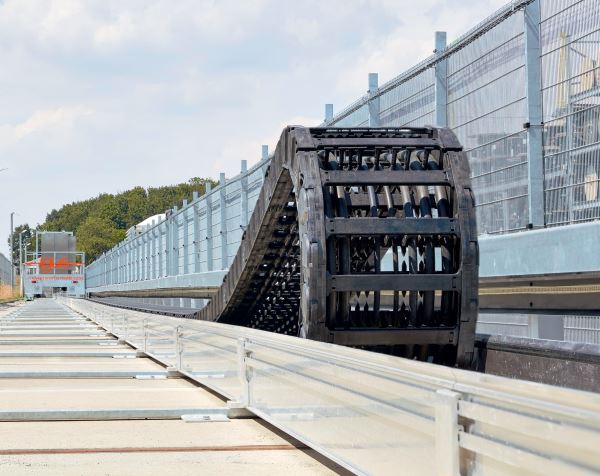Motion plastics specialist igus has added an automated test facility to its 3,800 sqm experimental laboratory in Cologne Porz-Lind, Germany.
The new state-of-the-art facility will allow the testing of polymer energy chains and cables outdoors at a speed of 8 m/s (28.8 km/h) on a 200m track, which corresponds to a 400m-long travel.
The fully automatic system accounts for a wide range of applications in terms of acceleration and speed. In addition to the mechanical load caused by the movement of the transfer vehicle, environmental influences act unimpeded on the tested energy chains and cables.
In the future, travels up to 1000m can be simulated with additional units.
igus’ Cologne experimental laboratory is the largest in the industry. Every year, 10 billion test cycles per year with e-chains and chainflex cables at 180 testing stations. 4,100 energy chain system tests are performed annually on 180 systems such as the climate chamber or on robots.
Operator challenges resolved
A great challenge for operators of sewage plants, waste incineration plants, cranes, power plants or mines is to guide data, energy and media safely on long travels. High speeds combined with a high fill weight often pose problems for energy supply systems such as motor cable drums, busbars or festoons.
An alternative is igus energy chain systems, available from Treotham Automation. Treotham is based in all major capital cities and supplies electrical and mechanical components to Australia's industrial automation sector.
The energy chain systems are tested in igus' own test laboratory and in order demonstrate to the customer that the system is reliable and will successfully work over long distances, igus has also placed the energy supply system in operation at the new automated test facility.
Energy chain systems from Treotham can be moved effortlessly over distances of up to one kilometre or more with a fill weight of 50 kg/m. As guidance for highly flexible chainflex cables and hoses, they can be guided smoothly and with low friction in long travels through guide troughs and enclosures.
This also includes the roller energy chains of the P4 series, which are tested in outdoor facilities.
The P4 series has already proven its worth in more than 1,000 crane and gantry applications worldwide. The chains can accommodate travels of up to 800m, high speeds of more than 5 m/s (18 km/h) and several million cycles with low vibration and traversing noise.
Rollers integrated in the chain link reduce friction to a minimum and increase service life. Due to the offset between upper run and lower run, the plastic rollers are not rolled over, but roll past each other to ensure smooth running.
As a result, the coefficient of friction decreases and the drive power is reduced by 57 per cent.
At the same time, igus uses its knowledge of polymers to further increase the service life of the e-chains. For example, in the P41.56 for long distances, lubrication-free and maintenance-free tribo-polymers are integrated in the bearing for pivoting motion, which doubles the service life of the e-chain.
Numerous experiments in the igus test laboratory served as a basis for such developments.
Treotham Automation Pty Ltd
1300 65 75 64
www.treotham.com.au


